
President Joe Biden signs the “Inflation Reduction Act of 2022”, on August 16, 2022, in the State Dining Room of the White House. ©White House/Cameron Smith)
It bears an acronym that would be bound to upset anyone from the UK: it’s called the IRA. Many in Britain recall the bombings and shootings over a great many years linked to the bid for greater Irish freedom, most of them organised by the IRA – the Irish Republican Army, a terrorist organisation. The two have no connection, of course, but it’s being suggested that while the IRA of previous years did terrible damage to lives and livelihoods, this latest manifestation could wreck Europe’s economy. So, the letters “IRA” could again stand for destruction. In this new case, IRA stands for Inflation Reduction Act which sounds innocent enough, and whose intentions are to make the US economy greener. That’s the official version. “The Inflation Reduction Act (IRA) of 2022 makes the single largest investment in climate and energy in American history,” says a US government website for the Department of Energy, “enabling America to tackle the climate crisis, advancing environmental justice, securing America’s position as a world leader in domestic clean energy manufacturing, and putting the United States on a pathway to achieving the Biden Administration’s climate goals, including a net-zero economy by 2050.” Sounds great, doesn’t it? Not to some of America’s trading partners, including the EU. “We are very concerned about the likely significant impact of the U.S. Inflation Reduction Act on the EU’s manufacturing base,” said Jozef Síkela, the Czech Minister of Industry and Trade, after a meeting of EU trade ministers. He has predicted that in a battle over the IRA subsidies, the only winner will be China. “A subsidy rally is a very dangerous game,” Jozef Síkela told reporters in Brussels. “The winner might then sit on [another] continent — not in Europe, and not on the American one,” he said. The Czech Republic currently holds the presidency of the Council of the EU, which is why Síkela also chairs the EU Trade Council. A spokesperson made it clear that Síkela was referring to China.
A mild disagreement among confirmed allies? Well, it’s a bit more that that, with EU officials accusing the US of profiting from the war in Ukraine over the cost of gas and also of weapons sold to Ukraine by the United States.
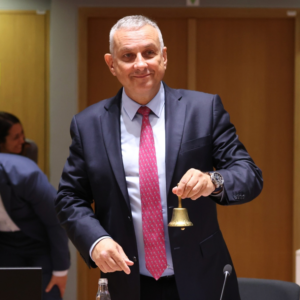
It’s reported in Britain’s right-leaning Daily Mail newspaper that one senior European official said during an interview with Politico that America is the country “that is most profiting from this war.” EU officials are already worried about the green subsidies that President Joe Biden has introduced because they fear that they could damage EU economies. President Biden and his team have denied that this will happen, but Biden’s “buy American” provisions could do severe damage to a number of EU countries in the year ahead.
Biden’s $430-billion (€415.27-billion) act includes state aid for certain sectors, such as the automobile industry, but it is conditional upon a product having components that were designed and made in the United States. The EU’s antitrust chief, Margrethe Vestager, Executive Vice President of the European Commission for A Europe Fit for the Digital Age,
has warned that taken together with soaring energy prices it could mean the end of the line for some European businesses, such as automotive manufacturers. The generous subsidies Washington is offering to its own manufacturers creates a very uneven playing field, in which the parts trodden by European companies seem to be studded with mines. For instance, a new electric vehicle manufacturer called Arrival is moving the focus of its production to the US in order to benefit from the tax credit system that is part of the IRA. Vestager, who is a European Commission vice-president, said the issue was crucial for the 27-country bloc. “We consider this a very important question. Because it is not just a question of some individual businesses also benefiting from the subsidies that is enabled by the Inflation Reduction Act,” Vestager told a European Parliamentary hearing. “It is a combination of the energy crisis and the way that the Inflation Reduction Act is working that puts at risk part of the industrial base in Europe.”

European experts are keen to ensure that the disagreement, serious though it undoubtedly is, does not grow into a full-blown trade war. That would benefit nobody. Officials in Brussels fear that a laudable attempt to curb the use of fossil fuels will have the effect of shutting out European manufacturers, while benefiting their American rivals, who will enjoy an unfair advantage. Some EU experts say it may even be in breach of international law by interfering with fair competition. Euronews reported on its website that Biden’s determination to emerge as a “champion of American industrial ingenuity and protector of American interests” (as the Democratic Party puts it) will inevitably create friction with his European allies. The website quotes Jacob Kirkegaard, a Senior Fellow at Germany’s Marshall Fund, who warns against permitting upset and annoyance to spark a trade war. “The last thing we want to do right now, the dumbest thing we can do, is to start a trade war because we’re in a weak position,” Kirkegaard said. He suggests that, instead, the EU should consider the case for Europe to allow the limited and carefully targeted use of public subsidies “towards the green transition to ensure that it happens as soon as possible and to ensure that European businesses are able to fully compete.”
| WELL-DONE IS BETTER THAN WELL-SAID
It was Benjamin Franklin who came up with that little truism. It’s remarkably true in this case. That is why an EU-US task force has been negotiating possible exceptions for European companies, but there is some doubt that a compromise can be reached or is even possible, although the EU side insists it only wants “fairness” (don’t we all?). “We want and expect European companies and exports to be treated in the same way in the US, as American companies and exports are treated in Europe,” he said. Yet again, it’s Russia’s unwarranted aggression that is complicating the picture, because the EU has become very dependent on the US where it involves supplying weapons to Ukraine and for liquified natural gas to compensate for the lost supplies from Russia. Attempts to overcome the difficulty are on-going. On 25 October, Bjoern Seibert, Head of Cabinet to EU Commission President Ursula von der Leyen, held talks in Berlin with Mike Pyle, the US Deputy National Security Advisor, to discuss the issues arising, which include the reconstruction of Ukraine. Together they agreed to launch a “Task Force” on the Inflation Reduction Act (IRA), which seems only to benefit Europe’s Trans-Atlantic friends (and rivals).
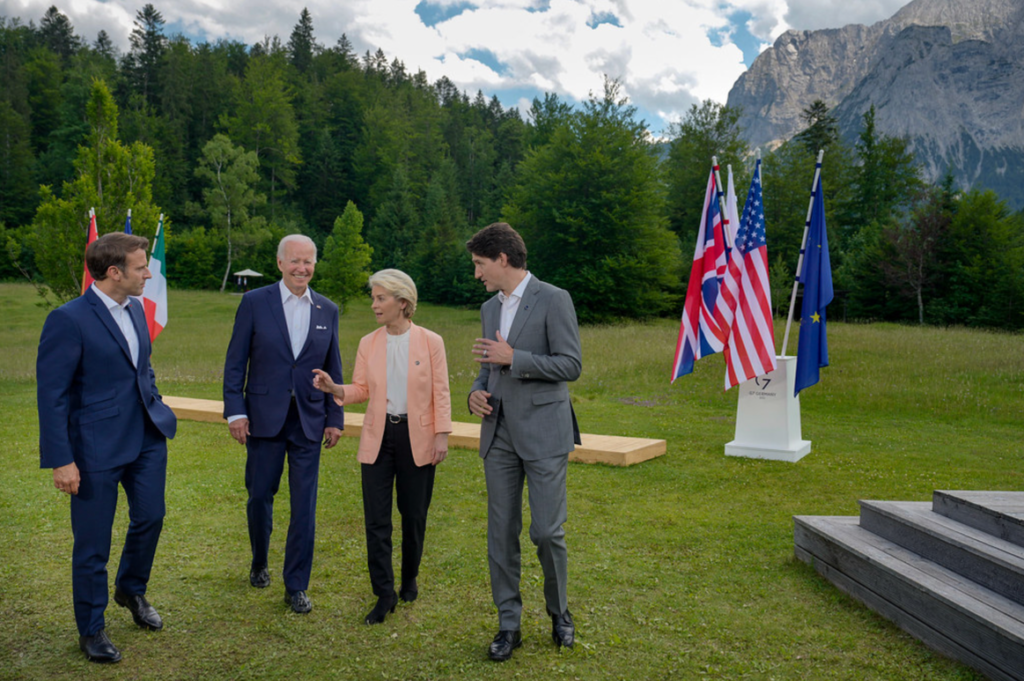
According to the Commission, the Task Force will address specific concerns raised by the EU with regard to the IRA, with both parties agreeing to work in “close coordination: and to try to support what are seen as sustainable and resilient supply chains across the Atlantic, including to build the clean energy economy.” Laudable plans, certainly, but not much help in the short term for European manufacturers facing intense competition from heavily subsidised American rivals. As part of the talks, Seibert will continue to have high-level discussions with US National Security Advisor Jake Sullivan, the National Economic Council Director, Brian Deese, and with John Podesta, the Senior Advisor for Clean Energy Innovation and Implementation. It was Mark Twain who said: “Actions speak louder than words but not nearly as often.” There is so far no sign that this troublesome issue can be easily resolved, if it can even be resolved at all. Failure to come up with a solution that satisfies everyone could impact on global international relations. Not every country reads the same signs in the same ways.
You only have to look at the immediate aftermath of Russia’s vicious and unprovoked attack on Ukraine. Reactions on both sides of the Atlantic brought the rapid imposition of sanctions by both Europe and the United States. There was talk at the time of a “silver lining” as the joint action brought the two closer together. Beijing, however, refused to criticise Russia and said that Beijing’s friendship with Moscow had “no limits”. China refused to condemn the invasion and EU leaders have agreed to view China more as a competitor than a partner, with Europe seeking to reduce its reliance on the Chinese economy.
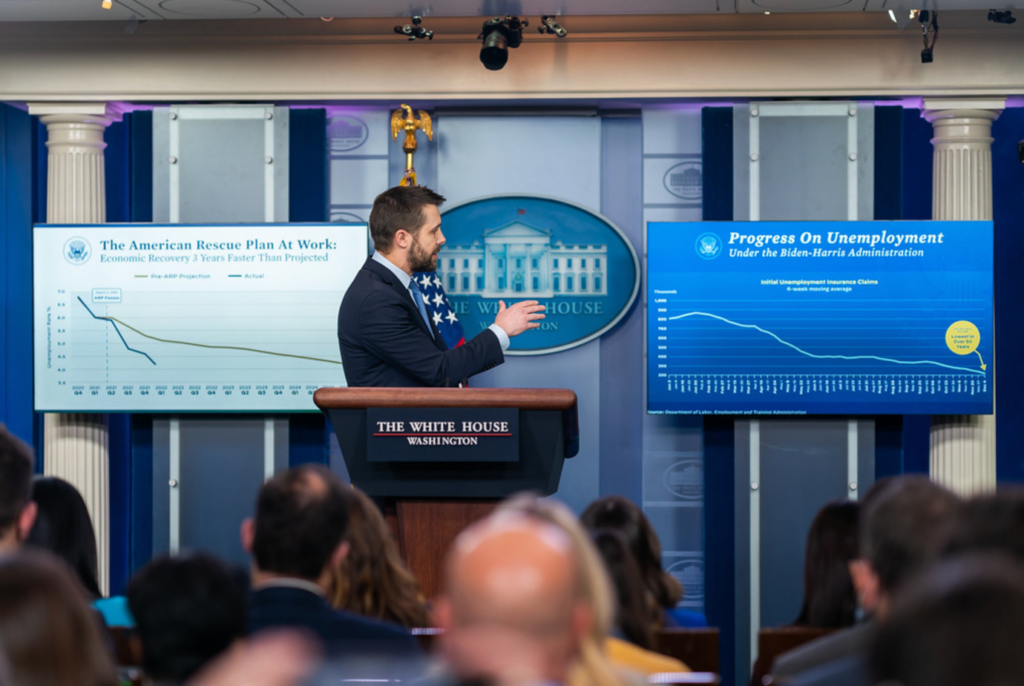
China has since promised to hold “neutrality” over Russia’s senseless land-grabbing war, but Europe doesn’t seem convinced. As the South China Morning Post reports, most EU countries really don’t want to have to choose between Beijing and Washington.
The US believes that the IRA will encourage other nations to follow suit, introducing their own green systems to encourage more climate-friendly system of manufacture. “We expect the Inflation Reduction Act to have a wide range of positive impacts for both our customers and for Ford,” said Jim Farley, Ford’s CEO. He, like others in the motor manufacturing business, is delighted with the incentives that the IRA provides. Speaking at a meeting about the company’s Third Quarter Earnings call, Farley mentioned the new battery-production tax credit, which he estimated to be worth some $45 (€43.46) per kilowatt-hour for Ford itself and for its battery-making partner, SK On. Britain’s Autocar magazine points out that the world’s cheapest electric vehicle battery up to now, which is made by China’s CATL company, costs an estimated $134 per kilowatt-hour. That makes the American product much more competitive and, Farley believes, inevitably more attractive. “I think this will have a dramatic impact on the adoption of the EV (electric vehicle),” he said. “This will help our profitability quite a bit, even next year.” Autocar also mentions General Motors, who have indicated that the subsidies the IRA provides could add between 5% and 7% to the company’s profit margin. It’s always about money in the end.

| DRIVING EVERYONE OFF THE ROAD
Not surprisingly, Europe’s car makers are very unhappy with this aid to success that no European car maker can match. Their representatives believe that incentives for electric vehicles should be more evenly balanced. The European Automobile Manufacturers’ Association (ACEA) has expressed its disappointment with the scheme. “The scope of the incentives for electric vehicles needs to be far more inclusive in order to achieve the rate of positive environmental change that our sector is committed to,” it said in a statement, and it called for all such EV incentive schemes to “be applied in a fair and equitable manner.” A number of firms involved in the EV industry – such as Arrival, now contemplating a move to the United States, as mentioned earlier – are looking hard at their production plans, aware of the impact the IRA could have on them and their competitors.
The Irish Times reported the Czech minister Jozef Síkela, saying: “What is important for us is that the US is aware of our concerns and the taskforce has to work out a solution which will be acceptable for both parties.” As the situation gets increasingly complicated, Síkela explained: “We will focus on having certain solutions in place for the TTC (Trade and Technology Council) on December 5th,” he added. By the time you are reading this, that date will have passed and I don’t expect any breakthroughs, do you?
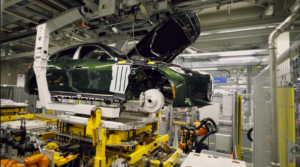
The issue is of greater concern than much of the popular press has reported. But the whole issue has somehow become mixed up with Russia’s “energy weapon”. The Economist magazine highlights the threat very neatly. “The fear has been amplified,” it says, “by America’s economic nationalism which threatens to draw activity across the Atlantic in a whirlwind of subsidies and protectionism. President Joe Biden’s Inflation Reduction Act involves $400-billion (€386.29-billion) of handouts for energy, manufacturing and transport and includes ‘make-in-America’ provisions.” The Economist likens the measures to some of those employed by China for several decades, supposedly to protect its economy. It also warns of a possible outcome that could be unfortunate: “As the other two pillars of the world economy become more interventionist, Europe, with its quaint insistence on upholding World Trade Organisation rules on free trade, looks like a sucker.” The Economist reports that companies around Europe are already taking measures of their own to counter what is clearly (if not exactly intentionally) a threat. Northvolt, a promising Swedish battery start-up, the magazine warns, has already said it wants to expand production in America. It also mentions the Spanish energy company, Iberdrola, which is now investing twice as much in America as it is in Europe. Even the German chemicals giant, BASF, has announced plans to downsize its European operations.

America is also getting annoyed that with American support for Ukraine so much greater than Europe’s, it’s no surprise that President Emmanuel Macron of France has called on Europe to “wake up”, while Germany’s economy minister, Robert Habeck, has accused America of “hoovering up investments”. The whole thing is exacerbating existing trans-Atlantic tensions, with America growing increasingly annoyed that the EU isn’t putting its money where its mouth is. The Economist points out in its editorial that Europe was “staggeringly naïve” about Russia’s aggression while the EU annoyed Washington by not paying for its own security. NATO members have not even met their goal of spending 2% of their GDP on defence. Even so, Biden must see how his protectionism (which is what the IRA is) threatens to drain Europe of its capacity – and its will – to tackle Russia. The best solution, in the view of The Economist is to make European firms eligible for the assistance being given to American manufacturers through the IRA.
Our motor industries were always very different, and largely driven by the differing road conditions and requirements.
| OLD-STYLE ECONOMICS
Biden’s measures would have received a warm welcome from the great British economist, John Maynard Keynes, who also became the First Baron Keynes. He believed that it was the state’s rôle to build a connecting bridge between the economy’s potential and its actual output during a financial crisis.
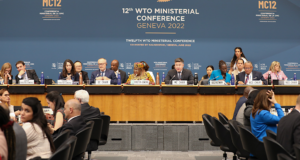
As a UK government website points out, however: “The European Community’s founding Treaty generally forbids State-funded aid that would favour certain businesses or goods production.” But, of course, such rules don’t apply to goods produced in the United States. The World Trade Organisation (WTO) is somewhat ambivalent on state aid and protectionism. “The WTO is sometimes described as a ‘free trade’ institution, but that is not entirely accurate,” says the organisation’s own website. “The system does allow tariffs and, in limited circumstances, other forms of protection. More accurately, it is a system of rules dedicated to open, fair and undistorted competition.” Note the word “fair”, which the IRA conspicuously is not.
So yes, the WTO supposedly promotes fair competition, or tries to. However: “The issues are complex, and the rules try to establish what is fair or unfair, and how governments can respond, in particular by charging additional import duties calculated to compensate for damage caused by unfair trade.” Is Biden merely encouraging moves towards a greener future? He says so, but as the WTO points out on its website: “the temptation to ward off the challenge of competitive imports is always present. And richer governments are more likely to yield to the siren call of protectionism, for short term political gain — through subsidies, complicated red tape, and hiding behind legitimate policy objectives such as environmental preservation or consumer protection as an excuse to protect producers.” I think that catches Biden both going and coming. Whatever sound reasons the US government claims in explanation, the WTO would clearly have its doubts: “Protection ultimately leads to bloated, inefficient producers supplying consumers with outdated, unattractive products. In the end, factories close and jobs are lost despite the protection and subsidies. If other governments around the world pursue the same policies, markets contract and world economic activity is reduced. One of the objectives that governments bring to WTO negotiations is to prevent such a self-defeating and destructive drift into protectionism.” However, in the short term, as long as you’re not concerned about harming your competitors and stirring up international tensions with your “friends”, it works.
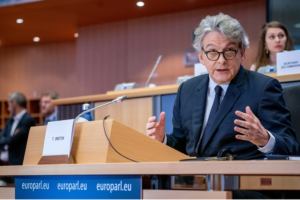
For the European Union, of course, Biden’s IRA is a massive threat. Thierry Breton, the EU Commissioner for the Internal Market, has pointed out in a Tweet that: “Impact of the energy crisis & US IRA on EU competitiveness is a real concern,” He then suggested his own possible solution: “We need a strong coordinated response for a resilient single market. More than ever, we need a mobilized EU business community”. He is seeking the thoughts of Europe’s various industry associations, but no-one has yet put forward a coherent plan that pleases everyone and promises a working riposte to American (intentionally or unintentionally) anti-free trade measures. Several prominent Europeans have mentioned how the IRA discriminates to the detriment of European companies and to damage Europe’s economy. One leading businessman said that the United States is “possibly discriminating against European companies through its Inflation Reduction Act, which gives tax credits for each eligible component produced in a US factory, which would take away potential investment from Europe.” Writing in EU Observer, Milan Elkerbout expressed the growing concern in Europe over a policy it could have welcomed, were it not potentially so damaging. “At long last, the Americans pass legislation that, arguably, constitutes a federal climate policy,” wrote Elkerbout, “But the road taken by the US is different from the EU’s. The world’s premier capitalist powerhouse is taking the path of state intervention through subsidisation and industrial policy, under the guise of fiscal policy.” Elkerbout knows what he’s talking about. He’s a Research Fellow and Head of the climate policy programme at the Centre for European Policy Studies (CEPS). He accepts, too, that Biden’s IRA puts the EU into a difficult position since it is, in effect, a federal climate policy, which the EU has called for in the past.

“The tax credits offered through the IRA are a powerful incentive,” writes Elkerbout. “They provide a direct revenue stream immediately improving the investment case for certain low-carbon technologies, such as carbon capture and storage (CCS) and hydrogen.” Elkerbout goes on to describe the response of some European manufacturers – to shift production to the US for the sake of the subsidies – as a “politician’s nightmare”. There’s little sign of them waking up any time soon, either. But Elkerbout is not calling for retaliatory measures, quite the reverse. “The EU and US should use the current tensions to revitalise the WTO,” we writes in EU Observer, “including by staffing its appellate body fully. For the US, the EU’s Carbon Border Adjustment Mechanism (CBAM) may have unwelcome protectionist elements, while the EU is similarly concerned about the IRA’s ‘buy-local’ requirements.” Elkbout wants, naturally enough, a peaceful solution. “Rather than attacking each other’s policies — both supporting essential industrial emissions reductions — the EU and US should seek ways to cooperate, such as through clubs or alliances, that can further strengthen green investment on both sides of the Atlantic.”
The row doesn’t seem to be harming the Americans. During the third quarter of this year the US economy grew faster than predicted and its gross domestic product rose at an annualized rate of 2.9%. Economists had predicted 2.7%. Growth may slow in the fourth quarter, however, because of inflation and interest rate rises imposed by the Federal Reserve. And, of course, there’s that Inflation Reduction Act, the IRA, that is scaring European businesses so badly. French Finance Minister Bruno Le Maire has said that the IRA was a major threat to European companies and that the EU had to stand firm against it. “We must clearly tell our US partners that it is a major problem for us,” he told BFM TV in an interview. “It is not acceptable. It could create a major shock on European industry.” Indeed, it seems to be driving some European companies to relocate to the United States. This is not what the Biden administration wanted to achieve, one must assume, but the whole mess is stirring up conflict in other areas.
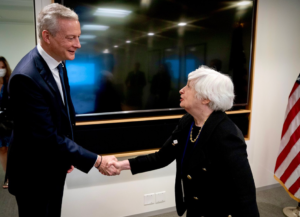
For instance, back in September, Germany angered its European Union partners by announcing a plan to support households and businesses with funds worth up to €200-billion, an amount few other countries can match, and which critics say threatens fair competition within the EU’s single market. Other EU countries have also announced support plans, but inevitably smaller, according to a report in Al Arabiya News. As time begins to show how big an effect small changes can have, most political leaders are, as the saying goes, “sticking to their guns”. But there is an old Icelandic saying that’s worth remembering: “A wise man changes his mind, a fool never will.” Meanwhile expect a lot of negative comment and angry responses. Politicians will always find ways to give their home-grown products an advantage over the competition if they can, and even rules and signed agreements won’t stop them.

